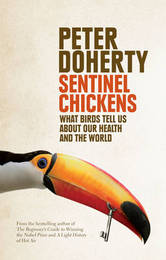
|
Sentinel Chickens: What Birds Tell Us About Our Health And Our World
Paperback / softback
Main Details
| Title |
Sentinel Chickens: What Birds Tell Us About Our Health And Our World
|
| Authors and Contributors |
By (author) Peter Doherty
|
| Physical Properties |
| Format:Paperback / softback | | Pages:240 | | Dimensions(mm): Height 208,Width 140 |
|
| Category/Genre | Popular science
Birds |
|---|
| ISBN/Barcode |
9780522861105
|
| Classifications | Dewey:598.00 |
|---|
| Audience | | General | | Tertiary Education (US: College) | |
|---|
|
Publishing Details |
| Publisher |
Melbourne University Press
|
| Imprint |
Melbourne University Press
|
| Publication Date |
1 August 2012 |
| Publication Country |
Australia
|
Description
"The idea of 'sentinel chickens' seemed pretty incongruous when I first heard the phrase as a young undergraduate...The notion of the humble chicken waiting like a trained soldier, alert and focused, for some unseen and approaching enemy just didn't seem likely. Hens en garde!" And yet guard they do. Not only chickens, but puffins, eagles, canaries and toucans - birds of all kinds are recruited by humans to help us interpret changes in our increasingly challenged and unpredictable world. These wonderful creatures continually sample the atmosphere, oceans, fields and forests, signalling toxic and environmental dangers that threaten all vertebrates. Through personal stories and fascinating examples, Nobel prize winner Peter Doherty shows also how birds have contributed to cutting-edge medical research. Studying birds has helped us to understand the nature of human cancer, malaria and influenza, and contributed to the development of new vaccines and cures. In his trademark style, Peter argues that since birds pollinate, spread plant seeds and control insects, endangering their habitats through human activities is a threat to our own well-being. Sentinel Chickens shows why we should give our feathered friends our close, sustained and caring attention.
Author Biography
Peter Doherty's pioneering research into human immune systems earned him the Nobel Prize for Physiology and Medicine in 1996.
|